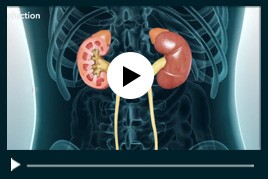Kidney Cysts
Cysts are abnormal fluid or semisolid-filled sacs that may arise in any tissue of the body, including the kidneys. They may be associated with serious conditions where they present as multiple cysts affecting kidney function, but are usually seen as simple single cysts that are noncancerous. Simple cysts are more common in men and usually develop with age.
Simple cysts are thought to develop from areas of weakness on the kidney surface where a pouch first develops and subsequently gets filled with fluid to form a cyst. They usually do not cause any symptoms, but simple cysts may grow in size leading to a dull pain in your back, side or upper abdomen, and fever.
Simple kidney cysts are most often identified when testing for another condition. Imaging studies such as a CT or MRI scan can help identify and differentiate a cyst from a tumour. Your kidney function is also evaluated through blood tests.
Simple kidney cysts are usually left untreated if they do not change in size, produce any symptoms or impair kidney function. Your doctor will recommend periodic monitoring to detect any changes. In case of symptoms or signs of kidney impairment, your doctor may recommend surgery to remove the cyst, which is usually accomplished by minimally invasive methods using small incisions. Alternatively, a long needle may be passed through your skin and guided with imaging studies to puncture and drain the kidney cyst, and fill it with alcohol to prevent it from recurring.

 Menu
Menu




